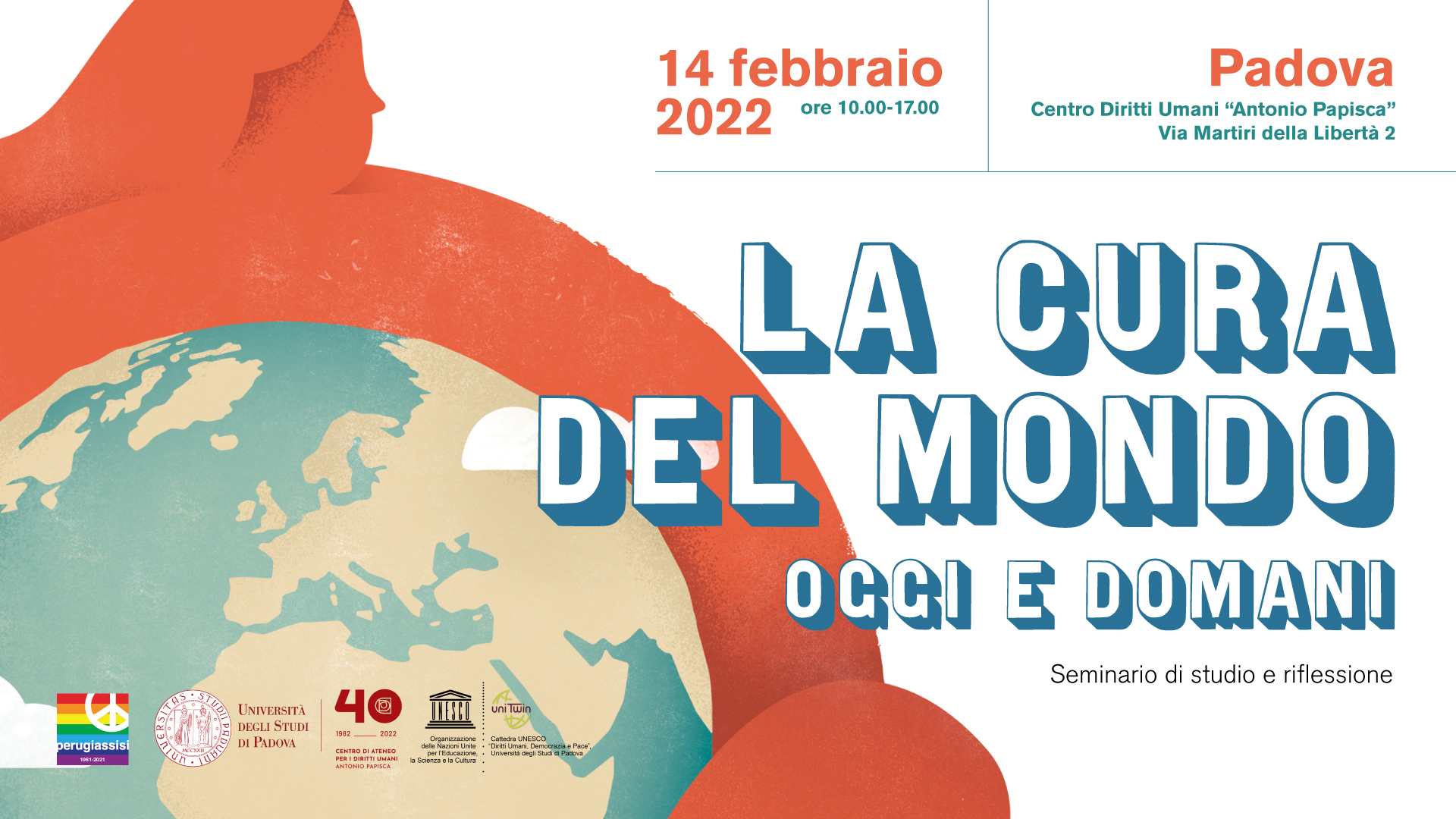Caring for the world, today and tomorrow, Human Rights Center, 14 February 2022
-
Event date: Monday, February 14, 2022
-
Time: 10 a.m. - 5 p.m.
-
Venue: "Antonio Papisca" Human Rights Center

100 years after the birth of Father Ernesto Balducci
On the 60th anniversary of the PerugiAssisi March for Peace and Fraternity
On the 40th anniversary of the founding of the Human Rights Center "Antonio Papisca" of the University of Padova
The world is suffering a very serious global crisis of care. All the world's warning lights are lit. The consequences of neglect, exploitation, unlimited individualism and unbridled competition now severely limit our freedoms and dreams. Climate change, the covid19 pandemic, the energy crisis, migration, new winds of war in Europe (along with all the other unresolved problems) are forcing us to come to terms with our planetary identity and the need to responsibly address complex, interconnected and interdependent global life problems. Yet, as the system of institutions and international relations built to promote peace and the well-being of humanity appears greatly weakened, many people have stopped caring about the world. What is happening? What has happened? Why do we need to start caring for the world again? What can we do? How can we extend care for the world?
Program
10.00 Greeting and introductions
Marco Mascia, UNESCO Chair of Human Rights, Democracy and Peace" Centro di Ateneo per i Diritti Umani "Antonio Papisca," University of Padova
Flavio Lotti, PerugiAssisi March Coordinator
10:30 a.m. - Part one
What is our relationship with the world today?
Aluisi Tosolini, Headmaster Liceo "Attilio Bertolucci"/Coordinator of the National Network of Schools of Peace
Francesco Cavalli, Director of Icaro Group
Beppe Giulietti, President of the National Federation of the Italian Press
Mariam Bouchraa, civil service volunteer
Elena Belia, civil service volunteer
Tancredi Marini, civil service volunteer
Francesca Benciolini, Councilwoman for Peace, Human Rights and International Cooperation, City of Padova
Roberto Reale, Journalist and writer, Lecturer at the Master of Science in Science Communication and the Masters Degree Course in Communication Strategies
Piero Piraccini, Peace Table
Enza Pellecchia, Coordinator of the Italian Network of Universities for Peace
Gabriella Salviulo, Director of the University Center for Human Rights "Antonio Papisca," University of Padova
12:00 p.m. - Part two
Why do we need to start caring for the world again? What will happen to us if we don't change our attitude?
Laura Nota, Lecturer in Professional Design and Career Counseling and Psychological Counseling for Social Inclusion of Disabilities and Social Hardship, Director of the Laboratory of Research and Intervention for Choice Orientation (L.a.R.I.O.S), University of Padova
Paola Milani, Lecturer in General and Social Pedagogy and Family Pedagogy, Director of the Laboratory for Research and Intervention in Family Education (LabRIEF), University of Padova
Jean Fabre, UN Expert, former deputy director UNDP Geneva
Fabio Ciconte, President of Terra! Onlus
Enrico Vicenti, Secretary General of the Italian National Commission for UNESCO, Rome
Manuel Manonelles, Director of the Center for Contemporary Studies of the Catalan Government, Barcelona
Marco Mascia, UNESCO Chair Human Rights, Democracy and Peace" Centro di Ateneo per i Diritti Umani "Antonio Papisca," University of Padova
1:00 p.m. Lunch Break
2:30-4:30 p.m. - Part three
How can we extend the care of the world?
Italo Fiorin, Founder EIS-LUMSA School of Higher Education
Anna Fasano, President of Banca EticaBenedetto Saraceno, Secretary General of the Lisbon Institute of Global Mental HealthRoberto Savio, Founder Other NewsGiampiero Griffo, Coordinator of the Technical and Scientific Committee of the National Observatory on the Condition of Persons with Disabilities, Presidency of the Council of Ministers
Francesco Anfossi, Journalist for Famiglia CristianaSilvana Amati, President of the Istituto Gramsci MarcheBruno Cooren, PerugiAssisi March Promoter CommitteeCristiano Colombi, Cooperative Economy is CommunityGuido Barbera, Cipsi President
Mario Galasso, Director Caritas Rimini
Amelia Rossi, Women's Anti-Violence Network
Randa Harb, National Network of Schools of Peace
Stefano Cecconi, Coordinator of the Territorial Health Welfare Network
Elisa Marincola, Spokesperson Article 21
Marco Piccolo, President of the Ethical Bank Foundation
4:30-5:00 p.m. Conclusions of the Seminar
The Seminar is promoted by the PerugiAssisi March Promoting Committee, the Human Rights Center "Antonio Papisca" and the UNESCO Chair of Human Rights, Democracy and Peace at the University of Padova, under the patronage of the Network of Italian Universities for Peace
For information: Human Rights Center
Via Martiri della Libertà, 2 - 35137 Padua
Tel. 049 827 1811 - email centro.dirittiumani@unipd.it PerugiAssisi March Promoter Committee,
Via della viola 1 (06122) Perugia
Tel. 075/5737266 - 335.6590356 - fax 075/5721234 - email adesioni@perlapace.it

